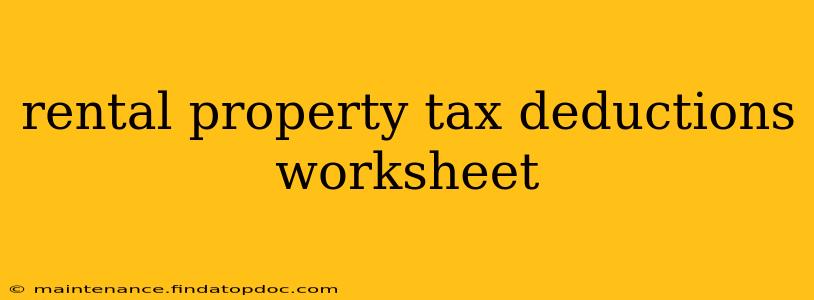Owning and managing rental properties can be lucrative, but it also comes with its share of complexities, especially when it comes to taxes. Understanding which expenses are deductible can significantly reduce your tax burden. This comprehensive worksheet will guide you through the process of identifying and calculating your rental property tax deductions. We'll cover everything from mortgage interest to repairs, ensuring you claim all the deductions you're entitled to.
Disclaimer: This worksheet is for informational purposes only and does not constitute tax advice. Consult with a qualified tax professional for personalized guidance.
What Expenses Are Deductible for Rental Properties?
Before diving into the worksheet, let's outline the key deductible expenses you should consider:
Direct Expenses (directly related to the rental property):
- Mortgage Interest: The interest portion of your mortgage payments.
- Property Taxes: Real estate taxes levied on your rental property.
- Insurance Premiums: Premiums paid for property insurance (hazard, liability).
- Repairs and Maintenance: Costs to maintain the property in good working order (e.g., fixing a leaky faucet, repainting). Note: Improvements (capital expenditures) are not deductible in the same year; they're depreciated over time.
- Depreciation: A deduction that allows you to recover the cost of the property over its useful life. This is a significant deduction for rental properties.
- Advertising and Marketing: Costs associated with finding tenants (e.g., online ads, newspaper listings).
- Utilities: If you pay for utilities (water, sewer, garbage), you can often deduct these expenses. Be aware of specific rules and how to allocate these if you also use a portion of the property for personal use.
- Management Fees: If you hire a property management company.
- Travel Expenses: If you travel to the property to manage it (e.g., inspecting, making repairs).
- Legal and Professional Fees: Costs related to managing the property (e.g., attorney fees for tenant disputes).
Indirect Expenses (less directly related, but still potentially deductible):
- Home Office Deduction: If you use a portion of your home exclusively and regularly for rental business activities, you may be able to deduct a portion of your home expenses. This requires careful calculation.
Rental Property Tax Deductions Worksheet: A Step-by-Step Guide
This worksheet uses a simplified approach; consult your tax professional for a more detailed analysis.
Section 1: Income
- Gross Rental Income: Total rent received during the year. _________
- Other Income: (e.g., late fees, parking fees) _________
- Total Rental Income (1 + 2): _________
Section 2: Expenses
- Mortgage Interest: _________
- Property Taxes: _________
- Insurance: _________
- Repairs and Maintenance: _________
- Depreciation: (Calculate based on the property's cost and useful life – consult a tax professional) _________
- Advertising and Marketing: _________
- Utilities: (Only the portion attributable to the rental property) _________
- Management Fees: _________
- Travel Expenses: _________
- Legal and Professional Fees: _________
- Other Expenses (Specify): _________
- Total Expenses (Sum of 1-11): _________
Section 3: Net Rental Income/Loss
- Net Rental Income/Loss (Total Rental Income - Total Expenses): _________
Section 4: Important Considerations
- Passive Activity Rules: Understand the passive activity loss rules. Losses from rental activities are generally limited to the amount of income from passive activities.
- Record Keeping: Maintain meticulous records of all income and expenses. This is crucial for tax audits.
- Professional Advice: Always consult with a tax advisor or accountant to ensure you are claiming all allowable deductions and complying with tax laws.
Frequently Asked Questions (FAQs)
What is depreciation, and how is it calculated for rental property?
Depreciation is an accounting method that allows you to deduct a portion of the cost of a rental property over its useful life. The calculation depends on the property's cost basis, its useful life (usually 27.5 years for residential rental property), and the depreciation method used (straight-line is most common). Consult a tax professional for accurate depreciation calculations.
Can I deduct the cost of improvements to my rental property?
No, the cost of improvements (capital expenditures) is not deductible in the year they are made. Improvements increase the value or useful life of the property and are depreciated over time. Repairs, on the other hand, maintain the property in its existing condition and are deductible.
What if I use a portion of my rental property for personal use?
If you use a portion of your rental property for personal use, you can only deduct the expenses associated with the rental portion of the property. You must allocate expenses based on the percentage of time the property is used for rental versus personal purposes.
How do I handle expenses paid in advance?
Expenses paid in advance should be deducted in the tax year they are incurred, not the year they are paid. For example, if you pre-pay insurance for the next year, you can generally only deduct the portion that covers the current tax year.
This worksheet provides a starting point for understanding rental property tax deductions. Remember to keep thorough records and consult with a tax professional for personalized advice to maximize your tax savings and avoid potential pitfalls.
